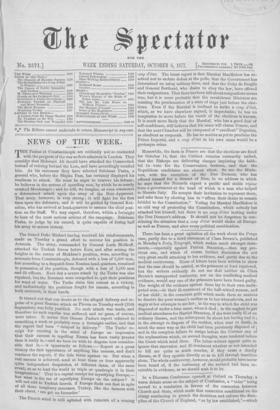There has been a great agitation all the week about
the Pengo case, partly due to a third statement of Clara Brown's, published in Monday's Daily Telegraph, which makes much stronger state- ments,—especially against Patrick Staunton,—than any pre- vious one, and which of course further diminishes the not very great credit attaching to her evidence, and partly due to the medical controversy. Hosts of letters have been written to show that the case should be retried, or the prisoners at least reprieved, but the writers evidently do not see that neither on Clara Brown's unsupported testimony, nor on the conflicting medical evidence, would any one of the prisoners have been found guilty. The weight of the evidence against them lay in their own undis- puted acts,—in their ill-treatment of the half -witted. woman, and of her child ; in the conscious guilt which made them so anxious to deceive the poor woman's mother as to her whereabouts, and so angry at her attempts to see her; in the way in which the child was disposed of under a false name, when it died ; in the neglect to get medical attendance for Harriet Staunton, if she were really ill of an ordinary disease, and the subsequent lie about her having had it ; in the attempt to dispose of the mother, when near to death, in much the same way as the child had been previously disposed of ; and in the complete failure to assign before the Coroner any of the explanations which, on second thoughts, were tendered before the Court which tried them. The letter-writers appear quite to ignore that starvation and ill-treatment whether or not intended to kill are quite as much murder, if they cause a deadly disease, as if they operate directly so as to kill through inanition alone. The whole controversy, however, would probably have never been heard of, if the testimony of the accused had been re- ceivable in evidence, as we should wish it to be.


































